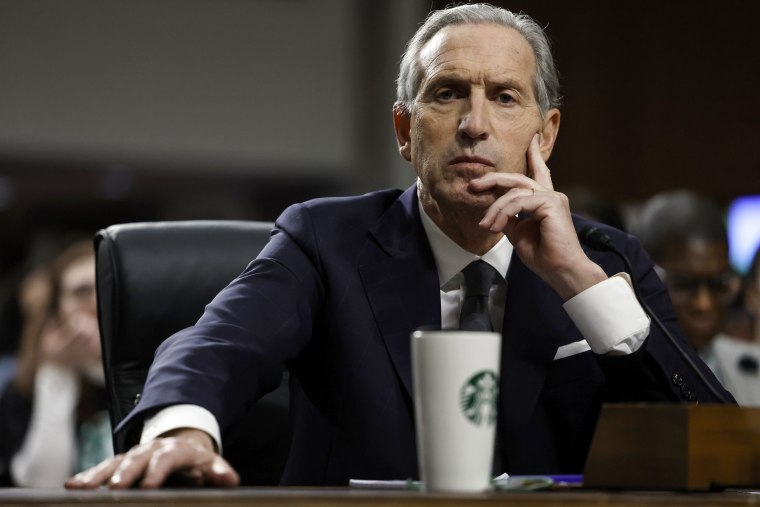Sen. Bernie Sanders, I-Vt., relentlessly grilled former Starbucks CEO Howard Schultz on Wednesday during Shultz's testimony before the Senate Health, Education, Labor and Pensions Committee about Starbucks' labor practices. “Over the past 18 months, Starbucks has waged the most aggressive and illegal union-busting campaign in the modern history of our country,” Sanders declared. Schultz denied throughout the hearing that the company has done anything illegal. But the National Labor Relations Board has issued more than 80 complaints over 278 unfair labor practice charges against the company, and has in the past handed down rulings that Starbucks broke federal labor law.
Schultz's language illustrates the delusion that extreme wealth generates among those who hold it.
Schultz — who had refused to appear before the Senate until Sanders threatened to subpoena him, and who may have resigned early to shield the company before the hearing — seemed particularly angry about one point: He said it was "unfair" that Sanders called him a billionaire. It was a bizarre bit of pushback, given that it's an indisputable fact. Schultz is worth nearly $4 billion. What he really meant was that bringing up his wealth implied unfair things about his character. It was pure nonsense — Sanders is right to point out how Schultz's class status as an ultra-wealthy owner puts him at odds with his employees and the public good.
Here's what Schultz said during the exchange:
This moniker billionaire, let's just get at that, OK? I grew up in federally subsidized housing. My parents never owned a home. I came from nothing. I thought my entire life was based on the achievement of the American dream. Yes, I have billions of dollars. I earned it, no one gave it to me. And I've shared it constantly with the people of Starbucks. ... It's your moniker constantly, it's unfair.
There are a couple of things to note about these remarkable comments.
First, in his attempt to describe his self-made wealth, Schultz accidentally admits that he was a beneficiary of the publicly funded social safety net: subsidized housing. It is undoubtedly impressive that Schultz managed to become a successful businessman after growing up in poverty — but his achievement of the American dream was enabled in part by the kinds of government involvement in American life he so fiercely opposes.
Second, Schultz describes himself as having shared his wealth with his employees, a formulation as offensive as it is bizarre. He's not giving his money away; he's paying workers. And he's not doing it particularly well: Hundreds of Starbucks stores have unionized so swiftly since the first one did in 2021 because his employees feel they are underpaid, subject to unfair scheduling practices, receive inadequate benefits, and, according to the NLRB, have been retaliated against for participating in union activities.
Schultz's language illustrates the delusion that extreme wealth generates among those who hold it. He apparently sees his exploitative company as a philanthropic endeavor. He believes his status as a job generator means he is beneficent, and should therefore stand above public scrutiny. But Schultz makes his money the same way every other major company in the world does: by extracting as much profit as possible from the labor of workers. That he's been very adept at this, to the point where he has unfathomable sums of money and employs people at tens of thousands of stores, should only intensify scrutiny of his behavior.
Schultz's frustration represents an anxiety that's increasingly evident among the country's capitalist class. In the not-too-distant past, so-called self-made billionaires were generally worshipped in mainstream American culture. Now they face increasing skepticism from the center and outright hostility from the left. But Schultz's discomfort isn't irrational. He and people in his wealth stratum know that the more the term "billionaire" rubs people the wrong way, the more likely it is that the public will pursue tax policies and regulations that could curtail their awesome power.

